Addressing Mental Health and Addiction in Roofing - PODCAST TRANSCRIPT
April 22, 2025 at 4:00 p.m.Editor's note: The following is the transcript of a live interview with Paul and Kimberly Reed of Roofers in Recovery. You can read the interview below or listen to the podcast.
Intro: Welcome to Roofing Road Trips, the podcast that takes you on a thrilling journey across the world of roofing. From fascinating interviews with roofing experts to on-the-road adventures, we'll uncover the stories, innovations and challenges that shape the rooftops over our heads. So fasten your seatbelts and join us as we embark on this exciting Roofing Road Trip.
Megan Ellsworth: Hello everyone. Welcome back to Roofing Road Trips from RoofersCoffeeshop.com. My name is Megan Ellsworth and I am really excited because in today's episode, we're going to be talking about Roofers In Recovery. I have Paul Reed here and this is just such an important topic. So, welcome to the podcast, Paul.
Paul Reed: Thank you. Thank you for having us on today. Looking forward to it.
Megan Ellsworth: Yeah, I'm also looking forward to it. So let's start out and have you just introduce yourself. Tell us a little bit about you.
Paul Reed: Awesome. So yeah, my name is Paul Reed. I'm a roofing contractor based out of Denver, Colorado. Work in quite a few different states, mainly on the western side of the United States.
Paul Reed: Also, probably more importantly, though, I'm a person of long-term recovery, meaning that I went to a rehab about 17 and a half years ago. Been clean and sober since then. And a few years ago, we started what's called Roofers In Recovery, which is a national 501(c)(3) nonprofit.
Megan Ellsworth: Amazing. Let's dive into Roofers In Recovery. How did this program come about and how old is it now, did you say?
Paul Reed: It's about, I should know exactly, but I'm going to say probably about seven years old now.
Megan Ellsworth: Okay.
Paul Reed: And the way that it actually started was, like I had mentioned, I went to rehab myself 17 and a half years ago and rehabs are not cheap and they're expensive to go to. Most people that need to go or have a desire to go probably don't have insurance. And so that was pretty much my story back then. And really, by the Grace of God, my family and friends had scraped enough money together and paid for me to go to rehab and just always knew that I needed to somehow figure how to give back and do more for other things.
Paul Reed: And so one day was just kind of driving down the road and was like, "Man, roofing industry has been really good to me. We need to figure out how to help and get somebody in our industry back to rehab." And so, that was really the start of it. Called actually Eric Oberembt and said, "Hey man, this is what I'd like to do and would love for you to go in on this and let's pull some money together and get someone into rehab." And that's what we did. So that was the start of it and then brought-
Megan Ellsworth: Wow.
Paul Reed: ... in Kim, my wife and said, "Hey, this is awesome." And so it's been running since then and Kim's been able to take it and make sure we got all our ducks in a row and I's dotted and T's crossed as far as how the nonprofit stuff goes. But that was just the way it started was had a desire to give back.
Megan Ellsworth: That is really powerful. I mean, just the fact too that you're paying for... or Roofers In Recovery is paying for people to go to rehab and have this chance to really help themselves and turn things around and start fresh. That's so powerful.
Paul Reed: Yeah.
Megan Ellsworth: That's really, really amazing. So, what would you say specific factors contribute to the mental health struggles in the roofing industry? Because I mean, we all know it's pretty prevalent.
Paul Reed: Oh my goodness, it really is. I heard some pretty eye-opening stats a few months ago at a We stern States. The CEO of NRCA was speaking and he talked about, "Hey, just in safety alone, we've been very focused on safety, which we should be. And in 2023, was roughly 38 people that unfortunately passed away due to a roofing accident, falling off a roof or et cetera."
Paul Reed: And he said, "That's tragic. We need to do more. We need to do better." But he said, "Where the real number lies is in the roofing industry. At the same time, there was over 5,000 people who committed suicide from mental health and drug addiction, which a lot of times are kind of tied in together." And I see that's a... from just your expression, that's a-
Megan Ellsworth: Yeah.
Paul Reed: ... mind-blowing stat. And I've known a lot of different numbers over the year and stats, but that one really affected me, knowing that we need to do more for our industry because with that type of number, that just proves that literally every company out there, there's somebody that's struggling.
Paul Reed: And the fact is, we're working long hours, we're hard in the sun. You get sore, you get tired, pretty easy to try to self-medicate or one of those things. Financial stresses, that start to cause a lot of anxiety and depression and all of those things really tie in together. The national average as well is our numbers are seven times higher than the national average as far as mental health issues.
Megan Ellsworth: Wow.
Paul Reed: Yep.
Megan Ellsworth: I mean, that's massive. Wow. From 38 also to 5,000, like you said, my reaction was so visceral. That is just... I'm glad we're talking about it because that's a shame. That's so, so heart-breaking. I'm so glad that whoever you were listening to speak brought that up. Very powerful.
Paul Reed: Yeah.
Megan Ellsworth: So, since this has become such a pressing issue within our industry, can you share some insights into why... maybe why these issues are so prevalent? I know you mentioned a few and how they've impacted workers, other workers personally.
Paul Reed: Yeah. Listen, for our industry and to me, it's the greatest industry in the world, right. It's provided an unbelievable life for me and so many other people that have been able to take advantage of it and do very, very well with it. But the reality is is that it's at a low bar of entry, which meaning that a lot of times... Very seldom, when a kid is in second grade and the school teacher says, "Hey, Johnny, what do you want to be when you're older?" Very seldom would they ever say a roofer. I don't think that happens very often. They want to be this or that. It's not something that a lot of people target as kids that they want to grow into.
Paul Reed: But a lot of people kind of fall into roofing because a lot of times there's really a lot of nowhere else for them to go. That's kind of the reality. Again, it's a great industry for those of us that are in it and have been able to stay in it and do well. But a lot of times, people fall into it because there's not... they lost their job at a car lot or they lost their job here or they've got DUIs and they can't get hired. They have a felony, but the roofing industry kind of is... accepts anybody. A lot of people don't want to talk about that, but there's a lot of reality to that.
Paul Reed: So I think that we're already dealing with people that have a bunch of issues kind of going on and it's the drinking and drugging is somewhat kind of accepted. It's construction and I believe it's 90% male-dominated industry and you want to call it the machismo of being the cool guy doing this or that and party and coming to work hung over. So I think the root base of who we are as an industry, we're already struggling a little bit to begin with. And I could say that because I'm one of [inaudible 00:08:21]. I'm one of the roofers, but that's who we're dealing with. And so then we get in and again, whatever your role is in the industry, if you're an installer, man, that's a hard job.
Paul Reed: I did it for 15 years from when I was 18 to 33 and getting up and grinding and carrying bundles of shingles up the ladder, tearing off roofs and you're sore and you're tired. And after work, it's kind of traditional. A lot of guys drink after work and things fall in. And as a business owner, maybe it's stressful and you self-medicate, but I just think that... I think our egos, right, because it's kind of the cool, tough guy industry, "I'm a roofer. I'm a construction worker." So I think that's all those things kind of combine into, that's the root base of it and it expands from there.
Megan Ellsworth: Yeah. Yeah. You're so right. And the point that I found really interesting that you made was, "We take anybody and everybody." And that, like you said, is such a dual-sided coin. It's so great. Anybody can come work in the roofing industry and I love that. But it is a lot of people come with prior sets of circumstances and suitcases and baggage and such that-
Paul Reed: Yes.
Megan Ellsworth: ... when you're working really hard up on a roof, those suitcases follow you, for sure.
Paul Reed: That's right. Yeah.
Megan Ellsworth: So, for contractors and workers in the field, how do you think we can start recognizing the signs of mental health issues, addiction or suicidal ideation?
Paul Reed: Honestly, I think just kind of talking about it. So we came up with that worksheet. I think most companies do a pretty good job of starting to take the safety serious now. A lot of companies do the toolbox talks every morning and we discuss ladder safety and we discuss fall protection and all those things. And I think to us and this is what we're starting to do, is we're including that in our toolbox talks. Once a week, we-
Megan Ellsworth: Nice.
Paul Reed: ... bring up of these issues been going on about anxiety and depression and drug abuse and all these things. And I think it's really just talking about it because here's kind of a sad reality. There's a pretty bad stigma just behind addiction and alcoholism. A lot of people don't want to talk about it.
Paul Reed: I believe it to be almost 10 times worse when you start talking about mental health, especially in the roofing and construction industry. Because again, go back to the fact it's 90% male-dominated industry and we're all cool guys and, "I don't want to talk to Johnny about, 'Hey, man, I'm not... I don't feel very good today. I'm full of anxiety or I'm really depressed.'"
Paul Reed: And so I think that if we're just able to start the conversation where people start to feel comfortable knowing like, "Hey, I'm not doing well and maybe if I do go talk to this person, maybe it's a safe space for me to do it because if I do it up on the roof, they're all going to make fun of me and call me a little baby" or things like that. So to us, it's we need to start the conversation to people... to where people know they can go somewhere and talk to somebody.
Megan Ellsworth: Yeah. I love that. Leading by example, adding it to the toolbox talks. And I think some people too are afraid to kind of open that can of worms, for lack of a better term, because then they might think, "Oh, everyone's going to start calling out, taking mental health days, whatever." But I think that's not the case at all. I think it grows a sense of safety and security in your crew that you feel safe to talk about these things. And I think that's great.
Paul Reed: Yeah. And listen, if you just go back to the number, 5,000 people, right.
Megan Ellsworth: Yeah.
Paul Reed: So our company has roughly about 400 employees, so you cannot tell me. The odds are I've got two to three guys in my own company that are struggling, right-
Megan Ellsworth: Wow.
Paul Reed: ... with mental health at minimum. We have two in our own company. And so, can we help get that number down? Can we get to 4,000 to 3000 and downward? And it's only going to happen by doing things like this and just getting the word out and really just trying to help break that stigma.
Paul Reed: No one likes to talk about addiction, no one really doesn't like to talk about mental health because scared that... because we're cool guys, right. We're cool guys and we're scared that someone's going to make fun of us if I say, "Hey, I get it. I've had mental health issues before." But I think it just... a few key people that do that can change the world.
Megan Ellsworth: I totally agree. So, what are some of the first steps to an effective intervention or a strategy to bring this kind of conversation up to workers or an employer or a co-worker or a peer?
Paul Reed: I think it's being consistent with the message of making sure that it's out. Even if we go every two weeks, but we're going to do it weekly in our company, but let's call it every two weeks that it's a consistent message because I think the first time that it happens that you get that message out, there's going to be a lot of jokes, a lot of laughter, people are going to be, "Ah." So I think the consistent level of that.
Paul Reed: And then warning about signs like, "Hey, is a guy just off today? Is he showing up late to work? Is he calling in at different times when he... more than a normal person that's got a cold or the flu?" Issues like that. Are they... Are we listening to what say? And so warning about the different signs and then also letting them know, "Hey, here's a number you could call. Here's a facility that can help you. Here's a hotline." Just different resources that we've brought out there. Yeah.
Megan Ellsworth: Okay. Okay. That's really helpful because I think that's... Like you said, the hardest part is taking that first step and once you noticing... notice someone acting different or strange, saying something. That could be the hardest but most pivotal thing to do.
Paul Reed: Absolutely. Absolutely. It's not easy to call someone out and it's not really even calling them out, but just offering them a hand of, "Hey, man, everything good? Can I help you with anything? Do you need to talk to anybody?" And a lot of times, they're going to be like, "Ah, I'm good." But hey, man, there's going to be that time that they're not.
Paul Reed: And they want... a lot of times, people that are going through it, they just want someone to say something to them. I know when I was going through my issues because, I mean, I was literally in a mental hospital a week before I went to rehab. And prior to that, I just wanted... deep down, I just wanted someone to care about me, to ask me if I was okay or whatever and I just wanted to talk to somebody.
Megan Ellsworth: Yeah. Have someone listen.
Paul Reed: Yeah.
Megan Ellsworth: Yeah. The power of listening is beyond, I think and that is such a gift you can give someone in that moment of pain and fear is just listening.
Paul Reed: Right.
Megan Ellsworth: Yeah.
Paul Reed: Right.
Megan Ellsworth: Wow. Okay. Well, this is an amazing conversation. Just have to say. How can roofing companies create a workplace culture that encourages open discussion about mental health and addiction without fear or stigma or judgment or the ooh, ooh, ooh laughing... laughing bit. What do you all do?
Paul Reed: So we created basically a handout, right. So it's about a...
Megan Ellsworth: Oh, that right.
Paul Reed: ... it's about a 10-page handout that we're trying to get out and we want them to implement-
Megan Ellsworth: Awesome.
Paul Reed: ... into the companies. And there's basically a one-pager that they could implement into the toolbox talks. And again, I'll go back of, I feel, ultimately, our responsibility is check this to do it weekly because it has to be a consistent message. Just like it is about ladder safety or fall protection, it has to be a consistent message.
Paul Reed: And we need someone in each and every company to kind of step up and be that guy of not judging, being non-judgmental, of being that rock and the support for someone saying, "Hey, I get it. I understand and there's nothing wrong with you. This happens to people and here's someone that you need to call. Here's a number that you need to call. Let's go in and do it right now. Let's go call them right now."
Megan Ellsworth: Absolutely. Is that handout available anywhere for public use?
Paul Reed: Yeah. So again, we've sent it. I sent it over to you guys. We sent it to NRCA, sent it to Western States and a few other organizations. So our hope is it gets out somewhere on a website. If not, people can reach out to me. I'll send it to them directly.
Megan Ellsworth: Nice. So that'll be on the Roofers In Recovery directory on RoofersCoffeeShop. So, if anyone wants that resource, go check that out. Okay. Moving on. Can you talk us through some of the services that Roofers In Recovery provides to those dealing with addiction and mental health challenges?
Paul Reed: Yeah, that's a great question. So, number one, we provide just like a mentorship or we call [inaudible 00:19:02] in the Rooms.
Megan Ellsworth: [inaudible 00:19:03].
Paul Reed: In AA, we call it a sponsorship as well, to where we'll connect you with someone that's in our industry that has went through what you're going through. You get on the phone with them and really kind of just start what we call working the steps and working together, doing that. So that's number one. Number two, be able to provide meeting lists of, "Hey, there's different meetings in your area where you're at in the United States."
Paul Reed: Thirdly, we have two times a week Zoom call, which is on Tuesday nights and Thursday mornings, where we have a recovery meeting. So there's guys, gals from all across the country that we get on and we do a recovery meeting. It's about an hour long. It's on Zoom again on Tuesday nights or Thursday mornings. We also, when you need to go into rehab, we have those resources to get you to rehab. We, my wife and I, actually have built a rehab in Southern Colorado in my old hometown. And so now that's the rehab facility that we use. So we get you to fly-
Megan Ellsworth: Wow.
Paul Reed: ... into Denver and then down to what's called Alamosa, Colorado and it's called Hope in the Valley. So it's a full continuum of care facility, meaning that there's a detox that, depending on what you're on, if it's harder drugs like the fentanyls, the heroines, things like that, you're going to need to be into the detox for a while, for a few days, anywhere from four to seven days probably. So we keep you in the detox or bad alcohol. And then, from there, you transition into what's called a residential treatment. From residential-
Megan Ellsworth: Wow.
Paul Reed: ... treatment, generally, they're 30 days. And from there, we kind do... kind of line you up to... with other roofers and recovery across the country from wherever you're at to get you into their group and into their community.
Paul Reed: And then, recently, we've kind of expanded into with the mental health stuff. What we have is what's called telehealth. So we have licensed counselors that are able to get on. There's some few state regulations sometimes that... So but anyway, we make that work. So it's really easy if you're from Colorado-
Megan Ellsworth: [inaudible 00:21:21].
Paul Reed: ... because that's all, but otherwise, we have resources to line you out with whatever. So we offer the telehealth as well.
Megan Ellsworth: Wow, that's amazing. Well, I don't know if you know this, but I live in Denver, so that is just really heartwarming for me to hear that you all... It's in Alamosa. This is, as we've talked about before, just such a rampant circumstance in our industry. And to see the amount of work you and Kim and Roofers In Recovery are putting into helping so many people is so... is what a breath of fresh air. So thank you-
Paul Reed: Thank you.
Megan Ellsworth: ... Paul, for all your work that you're doing. It's very powerful. How can or what can roofing professionals and industry leaders do right now to help you in making this difference in addressing mental health, addiction, suicide within the workforce?
Paul Reed: I think being bold in your company, being bold in your company and bringing the topics up. Again, we don't want to talk about it, but being bold and bringing it up. We also, because we are a nonprofit, we do have... on June 3rd, we have what's called the Roofers In Recovery Day. And what we ask is that you sell a job and on June 3rd that you are able to build it and from there, pay your crew, pay your manufacturer and please donate the remaining money over to Roofers In Recovery.
Paul Reed: That's how we pay to get these guys into rehab. And what we've done by opening up our own rehab is we are able to control the costs now. Before, it was... excuse me, cost us roughly about $15,000 to send someone to rehab. We got a really good deal from other people, from other facilities that we were using, but now we can get in a couple of people because we can control the costs and we're not going to profit off of that.
Paul Reed: So we could get in two to three people now for what we used to be able to pay for one. But yeah, that's the biggest thing is, please donate. It is a write-off, right. It is a write-off because we are a 501(c)(3) nonprofit, so that helps with your taxes. And then probably, more importantly, is just let your guys know that there's a place for them to go to continue to get the message out of, "Hey, there's guys here that are willing to help and we have a spot for you."
Megan Ellsworth: Yeah, absolutely. And it's for everybody. Business owners, people on the roof, people i.
Paul Reed: Mm-hmm.
Megan Ellsworth:... manufacturing, in distribution. Yeah. Wow. So, everyone, definitely go to the Roofers In Recovery directory on RoofersCoffeeShop.com. You can find their website there, where you can donate.
Megan Ellsworth: Please donate and we'll get out an additional promotion on June 3rd to make sure everyone knows that it is Roofers In Recovery Day. And to please donate because this is changing lives and really changing the face of our industry. And so thank you, Paul, for all of your... the work you do.
Paul Reed: I appreciate it. Thank you for having me on today.
Megan Ellsworth: You're so welcome. Everyone, please make sure you are subscribed and ring the bell so you get notified every time we have a new episode. And please make sure you donate to Roofers In Recovery. We'll see you next time on the next Roofing Road Trip.
Outro: If you've enjoyed the ride, don't forget to hit that subscribe button and join us on every roofing adventure. Make sure to visit RoofersCoffeeShop.com to learn more. Thanks for tuning in and we'll catch you on the next Roofing Road Trip.




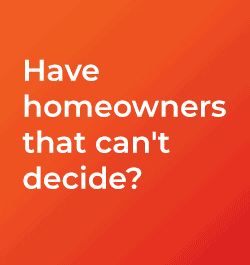








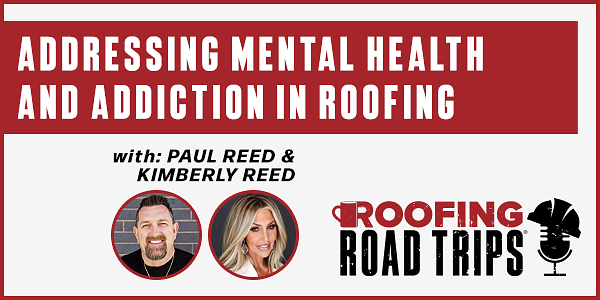
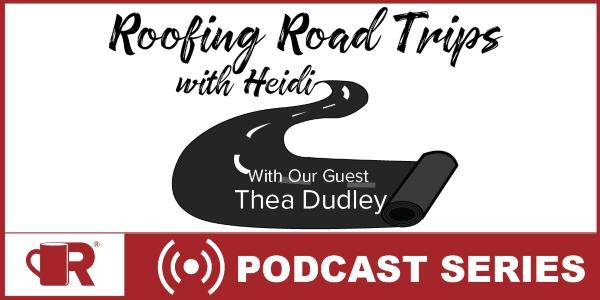
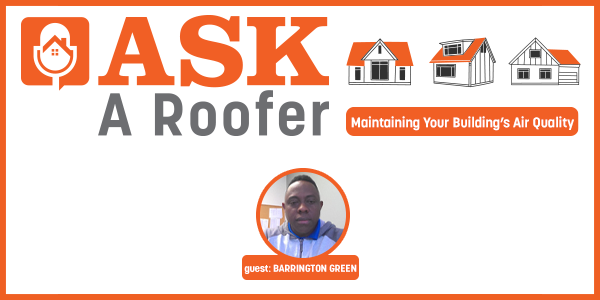


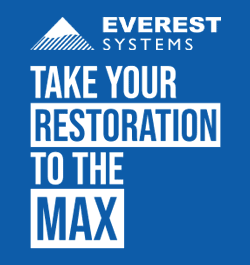
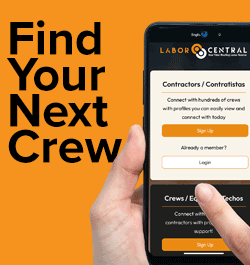
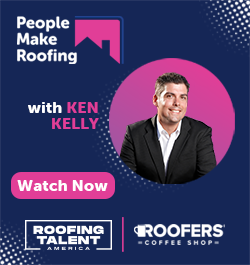
Comments
Leave a Reply
Have an account? Login to leave a comment!
Sign In